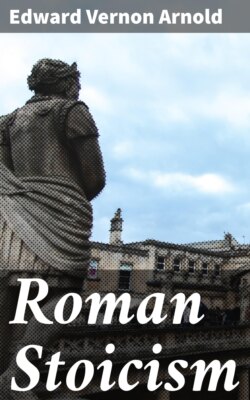Roman Stoicism

Реклама. ООО «ЛитРес», ИНН: 7719571260.
Оглавление
Edward Vernon Arnold. Roman Stoicism
Roman Stoicism
Table of Contents
PREFACE
CORRIGENDA ET NOTANDA
CHAPTER I. THE WORLD-RELIGIONS
Footnote
CHAPTER II. HERACLITUS AND SOCRATES
Footnote
CHAPTER III. THE ACADEMY AND THE PORCH
Footnote
CHAPTER IV. THE PREACHING OF STOICISM
Footnote
CHAPTER V. THE STOIC SECT IN ROME
Footnote
CHAPTER VI. OF REASON AND SPEECH
Footnote
CHAPTER VII. THE FOUNDATIONS OF PHYSICS
Footnote
CHAPTER VIII. THE UNIVERSE
Footnote
CHAPTER IX. THE SUPREME PROBLEMS
Footnote
CHAPTER X. RELIGION
Footnote
CHAPTER XI. THE KINGDOM OF THE SOUL
Footnote
CHAPTER XII. THE LAW FOR HUMANITY
Footnote
CHAPTER XIII. DAILY DUTIES
Footnote
CHAPTER XIV. SIN AND WEAKNESS
Footnote
CHAPTER XV. COUNSELS OF PERFECTION
Footnote
CHAPTER XVI. STOICISM IN ROMAN HISTORY AND LITERATURE
Footnote
CHAPTER XVII. THE STOIC STRAIN IN CHRISTIANITY
Footnote
BIBLIOGRAPHY
I. ANCIENT WRITERS AND PHILOSOPHERS
II. MODERN WRITERS
GENERAL INDEX
GREEK INDEX
Отрывок из книги
Edward Vernon Arnold
The history of the Stoic philosophy with special reference to its development within the Roman Empire
.....
Except that a simple form of theism has replaced the Buddhist atheism, there is hardly a word here that we might not expect from a Buddhist monk.
18. The Stoic philosophy was founded by Zeno of Citium (350-260 B.C.). Although he lived and taught at Athens, his youth was spent in a city that was half Phoenician, and many of his most distinguished followers had a like association with the Eastern world. The system deals with all the great themes touched upon by Chaldaism, Persism, and Buddhism. Like the first, it insists that there exists an unchanging Destiny, according to which events throughout the universe are predetermined from all eternity. Like the second, it sets up as claiming the worship and allegiance of men a Supreme Deity, who governs the world with boundless power and benevolent will, and is manifested to men as the Logos or ‘divine Word.’ In its interpretation of the physical universe it accepts as a first principle a living and creative fire, ultimately identical with the deity, and containing the germs of the whole creation. It sees in the will of man an independent and divine power, subject to no compulsion from without, but attaining its highest and best by willing submission to the Supreme Being. In its practical ethics, though it does not advocate the suppression of all desires, it so far agrees with Buddhism as to hold that happiness is only found in the subordination of individual claims to the voice of universal reason. Finally, its teachers are actively engaged in propagating its doctrines and guiding its disciples. Stoicism has, in short, the inward and outward characteristics of the other great movements we have described, and may claim without presumption to be reckoned amongst the world-religions[51].
.....